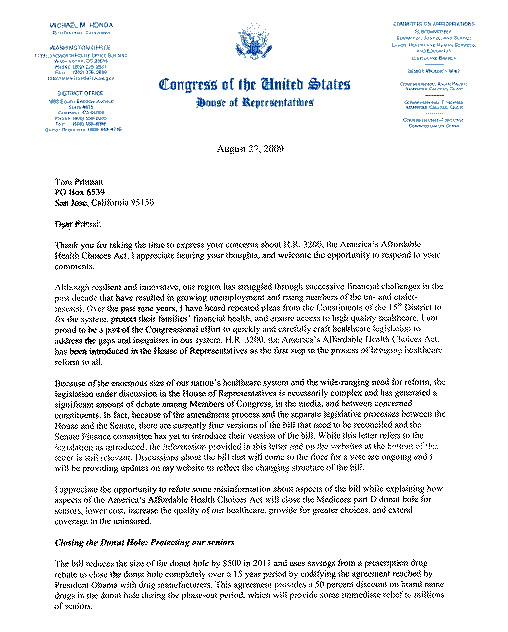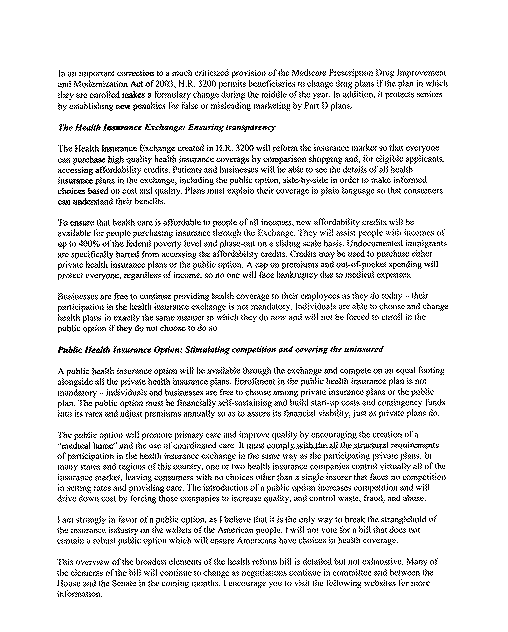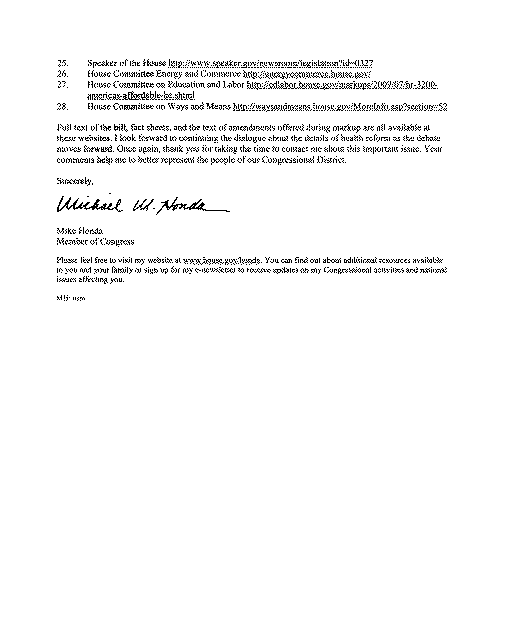






August 27, 2009
Tom Pittman
PO Box 6539
San Jose, California 95150Dear Friend:
Thank you for taking the time to express your concerns about H.R. 3200, the America's Affordable Health Choices Act. I appreciate hearing your thoughts, and welcome the opportunity to respond to your comments.
Although resilient and innovative, our region has struggled through successive financial challenges in the past decade that have resulted in growing unemployment and rising numbers of the un- and under- insured. Over the past nine years, I have heard repeated pleas from the Constituents of the 15th District to fix the systern, protect their families' financial health, and ensure access to high quality healthcare. I am proud to be a part of the Congressional effort to quickly and carefully craft healthcare legislation to address the gaps and inequities in our system. H.R. 3200, the America's Affordable Health Choices Act, has been introduced in the House of Representatives as the first step in the process of bringing healthcare reform to all.
Because of the enormous size of our nation's healthcare system and the wide-ranging need for reform, the legislation under discussion in the House of Representatives is necessarily complex and has generated a significant amount of debate among Members of Congress, in the media, and between concerned constituents. In fact, because of the amendment process and the separate legislative processes between the House and the Senate, there are currently four versions of the bill that need to be reconciled and the Senate Finance committee has yet to introduce their version of the bill. While this letter refers to the legislation as introduced, the information provided in this letter and on the websites at the bottom letter is still relevant. Discussions about the bill that will come to the floor for a vote are ongoing and I will be provding updates on my website to reflect the changing structure of the bill.
I appreciate the opportunity to refute some misinformation about aspects of the bill while explaining how aspects of the America's Affordable Health Choices Act will close the Medicare part D donut hole for seniors, lower cost, increase the quality of our healthcare, provide for greater choices, and extend coverage to the uninsured.
Closing the Donut Hole: Protecting our seniors
The bill reduces the size of the donut hole by $500 in 2011 and uses savings from a prescription drug rebate to close the donut hole completely over a 15 year period by codifying the agreement reached by President Obama with drug manufacturers. This agreement provides a 50 percent discount on brand name drugs in the donut hole during the phase-out period, which will provide some immediate relief to millions of seniors.
In an important correction to a much criticized provision of the Medicare Prescription Drug Improvement and Modernization Act of 2003, H.R. 3200 permits beneficiaries to change drug plans if the plan in which they are enrolled makes a formulary change during the middle of the year. In addition, it protects seniors by establishing new penalties for false or misleading marketing by Part D plans.
The Health Insurance Exchange: Ensuring transparency
The Health Insurance Exchange created in H.R. 3200 will reform the insurance market so that everyone can purchase high quality health insurance coverage by comparison shopping and, for eligible applicants, accessing affordability credits. Patients and businesses will be able to see the details of all health insurance plans in the exchange, including the public option, side-by-side in order to make informed choices based on cost and quality. Plans must explain their coverage in plain language so that consumers can understand their benefits.
To ensure that health care is affordable to people of all incomes, new affordability credits will be available for people purchasing insurance through the Exchange. They will assist people with incomes of up to 400% of the federal poverty level and phase-out on a sliding scale basis. Undocumented immigrants are specifically barred from accessing the affordability credits. Credits may be used to purchase either private health insurance plans or the public option. A cap on premiums and out-of-pocket spending will protect everyone, regardless of income, so no one will face bankruptcy due to medical expenses.
Businesses are free to continue providing health coverage to their employees as they do today -- their participation in the health insurance exchange is not mandatory. Individuals are able to choose and change health plans in exactly the same manner in which they do now and will not be forced to enroll in the public option if they do not choose to do so.
Public Health Insurance Option: Stimulating competition and covering the uninsured
A public health insurance option will be available through the exchange and compete on an equal footing alongside all the private health insurance plans. Enrollment in the public health insurance plan is not mandatory -- individuals and businesses are free to choose among private insurance plans or the public plan. The public option must be financially self-sustaining and build start-up costs and contingency funds into its rates and adjust premiums annually so as to assure its financial viability, just as private plans do.
The public option will promote primary care and improve quality by encouraging the creation of a "medical home" and the use of coordinated care. It must comply with all the structural requirements of participation in the health insurance exchange in the same way as the participating private plans. In many states and regions of this country, one or two health insurance companies control virtually all of the insurance market, leaving consumers with no choices other than a single insurer that faces no competition in setting rates and providing care. The introduction of a public option increases competition and will drive down cost by forcing those companies to increase quality, and control waste, fraud, and abuse.
I am strongly in favor of a public option, as I believe that it is the only way to break the stranglehold of the insurance industry on the wallets of the American people. I will not vote for a bill that does not contain a robust public option which will ensure Americans have choices in health coverage.
This overview of the broadest elements of the health reform bill is detailed but not exhaustive, Many of the elements of the bill will continue to change as negotiations continue in committee and between the House and the Senate in the coming months. I encourage you to visit the following websites for more information.
25. Speaker of the House http://www.speaker.gov/newsroom/legislation?id=0327
26. House Committee Energy and Commerce http://energycommerce.house.gov/
27. House Committee on Education and Labor http://edlabor.house.gov/markups/2009/07/hr-3200- americas-affordable-he.shtml
28. House Committee on Ways and Means http://waysandmeans.house.gov/MoreInfo.asp?section=52Full text of the bill, fact sheets, and the text of amendments offered during markup are all available at these websites. I look forward to continuing the dialogue about the details of health reform as the debate moves forward. Once again, thank you for taking the time to contact me about this important issue. Your comments help me to better represent the people of our Congressional District.
Sincerely,

Mike Honda
Member of CongressPlease feel free to visit my website at www.house.gov/honda. You can find out about additional resources available to you and your family or sign up for my e-newsletter to receive updates on my Congressional activities and national issues affecting you.
MH: usm
Some specific problems with what Honda said:
carefully craft healthcare legislation to address the gaps and inequities in our system.
Unfortunately, this legislation creates new gaps and inequities in the system, particularly by penalizing those people who conscientiously choose to do their part in reducing health care costs for everybody by refusing to patronize the insurance companies, which are the cause of the problem, and not the cure.
bringing healthcare reform to all.
It does bring "reform" to me by destroying the basis for the best health
care available to me.
I suppose this is important to people suckered into the Part D MediCare scam, but as I do not intend to be among them, I don't much care about this -- except I wish Federal taxes were being better spent to reduce the deficit, not increase it.
everyone can purchase high quality health insurance
This is a lie wrapped in a half-truth. The lie is in the word "can". What they mean is that everyone is compelled to purchase health insurance, under an onerous tax penalty more than twice the size of the stamp tax England imposed on American tea, which led to the Boston Tea Party. The half-truth is the "high quality health insurance" part. The party in power is cozying up to their version of the military-industrial-complex (just a different industry than they accused the Republicans of) by forcing everyone to buy that industry's product whether they need and want it or not. "High-quality insurance" does not translate into high quality health care, but rather the reverse. The only way to get high quality health care is to eliminate the middle-man (insurance company) making decisions. INSURANCE IS THE PROBLEM, NOT THE SOLUTION
no one will face bankruptcy due to medical expenses.
No, they will face bankruptcy due to increased taxes and compulsory insurance payments, which, like Social Security, fall disproportionately on the lower income brackets.
Businesses are free to continue providing health coverage to their employees as they do today
That's a lie. Businesses are penalized even more heavily than individuals for offering their employees the best possible medical care, that is, which avoids the overhead costs of insurance. The proposed law explicitly intends to penalize businesses attempting to "self-insure". Small businesses can escape the tax by laying off employees or cutting salaries above a specified payroll threshold. That's hardly a cure for unemployment, is it?
public health insurance option will ... compete on an equal footing
If you believe that, you might also be interested in a bridge... We have existing examples of the "public option" competing on an equal footing with private businesses: The US Postal Service competes with UPS and FedEx, but UPS and FedEx are not permitted to carry correspondence, not deliver to mailboxes. Social Security competes with private retirement plans; plans? What plans? There's IRAs, but you are restricted in how much you can put away, and the taxes really bite. There are the union-sponsored plans that are bankrupt. Oh, I forgot, so is Social Security. The USPS would be bankrupt too, but they keep raising their rates faster than inflation. Not a lot to look forward to, but at least they are calling it an "option". I wonder how long that will last.
a single insurer that faces no competition in setting rates and providing care.
What they don't tell you is that the proposed law mandates levels of coverage so there will be no significant competition anyway. Go to any bank in your state: they all offer exactly the same services for exactly the same prices. They even have exactly the same fine print telling you that they have no privacy policy. Federal law ties their hands. That's what HR3200 is promising for health care: no meaningful competition at all.
break the stranglehold of the insurance industry on the wallets of the American people.
The insurance industry has no stranglehold on anybody. You can choose to buy their services, or not. Today only. When this law passes, then you will see a stranglehold on your wallets -- from taxes as well as compelled insurance premiums.